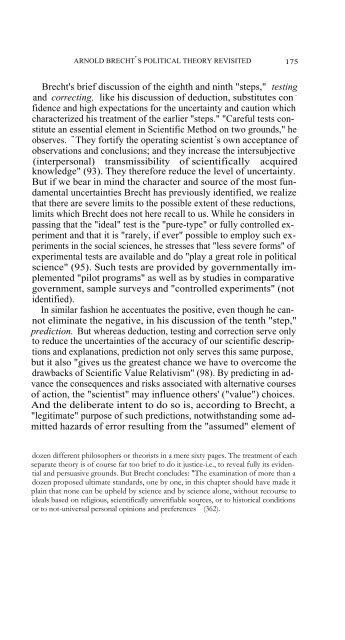ARNOLD BRECHT'S POLITICAL THEORY REVISITED Political ...
ARNOLD BRECHT'S POLITICAL THEORY REVISITED Political ...
ARNOLD BRECHT'S POLITICAL THEORY REVISITED Political ...
Create successful ePaper yourself
Turn your PDF publications into a flip-book with our unique Google optimized e-Paper software.
<strong>ARNOLD</strong> BRECHT ' S <strong>POLITICAL</strong> <strong>THEORY</strong> <strong>REVISITED</strong> 175<br />
Brecht's brief discussion of the eighth and ninth "steps," testing<br />
and correcting, like his discussion of deduction, substitutes con -<br />
fidence and high expectations for the uncertainty and caution which<br />
characterized his treatment of the earlier "steps." "Careful tests constitute<br />
an essential element in Scientific Method on two grounds," he<br />
observes. " They fortify the operating scientist ' s own acceptance of<br />
observations and conclusions; and they increase the intersubjective<br />
(interpersonal) transmissibility of scientifically acquired<br />
knowledge" (93). They therefore reduce the level of uncertainty.<br />
But if we bear in mind the character and source of the most fundamental<br />
uncertainties Brecht has previously identified, we realize<br />
that there are severe limits to the possible extent of these reductions,<br />
limits which Brecht does not here recall to us. While he considers in<br />
passing that the "ideal" test is the "pure-type" or fully controlled experiment<br />
and that it is "rarely, if ever" possible to employ such experiments<br />
in the social sciences, he stresses that "less severe forms" of<br />
experimental tests are available and do "play a great role in political<br />
science" (95). Such tests are provided by governmentally implemented<br />
"pilot programs" as well as by studies in comparative<br />
government, sample surveys and "controlled experiments" (not<br />
identified).<br />
In similar fashion he accentuates the positive, even though he cannot<br />
eliminate the negative, in his discussion of the tenth "step,"<br />
prediction. But whereas deduction, testing and correction serve only<br />
to reduce the uncertainties of the accuracy of our scientific descriptions<br />
and explanations, prediction not only serves this same purpose,<br />
but it also "gives us the greatest chance we have to overcome the<br />
drawbacks of Scientific Value Relativism" (98). By predicting in advance<br />
the consequences and risks associated with alternative courses<br />
of action, the "scientist" may influence others' ("value") choices.<br />
And the deliberate intent to do so is, according to Brecht, a<br />
"legitimate" purpose of such predictions, notwithstanding some admitted<br />
hazards of error resulting from the "assumed" element of<br />
dozen different philosophers or theorists in a mere sixty pages. The treatment of each<br />
separate theory is of course far too brief to do it justice-i.e., to reveal fully its evidential<br />
and persuasive grounds. But Brecht concludes: "The examination of more than a<br />
dozen proposed ultimate standards, one by one, in this chapter should have made it<br />
plain that none can be upheld by science and by science alone, without recourse to<br />
ideals based on religious, scientifically unverifiable sources, or to historical conditions<br />
or to not-universal personal opinions and preferences " (362).
















